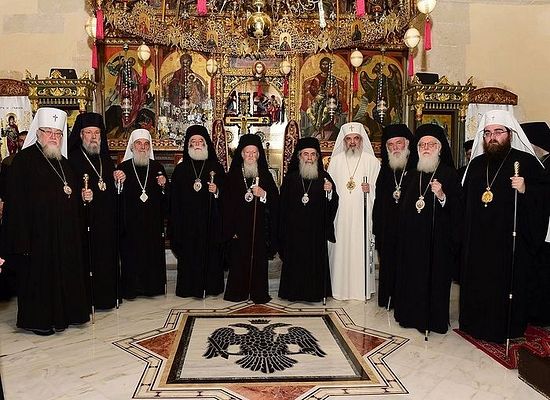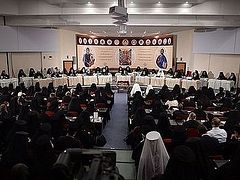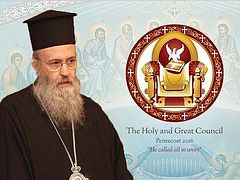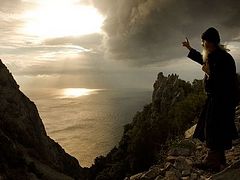Source: TheHuffingtonPost.com
Ecumenical Patriarch Bartholomew, during his opening address at the Holy and Great Council of the Orthodox Church, quoted the preacher with the golden mouth, St. John Chrysostom: “For the term ‘church’ is defined as a system and synod.”
Both the term ‘church’ and the system of synod have generated a great deal of discussion recently and regrettably some division as well.
Archbishop Anastasios of Albania remarked in his opening statement that the “Heresy of our time is egocentrism.” Following the Inaugural Session, I spoke with a well-known delegate about the Archbishop’s statement, and on the self-centredness of many monomaniacal critics of the Council.
One of his comments was especially insightful.
He compared them to the pope, and argued that unlike the Roman pontiff who is put there by others based on their history and tradition, these critics are self-appointed arbiters of the truth. The extreme positions and unfounded accusations they often espouse limit freedom and stifle debate.
Observing the Holy and Great Council at the Orthodox Academy of Crete last month, I witnessed differences among the delegates. Each bishop brought his own set of skills and experiences to the deliberations. A missionary bishop in Africa, for instance, will have a different outlook than a bishop from an Orthodox Christian country. Does this mean one is “more” Orthodox than the other?
There have been differences throughout the history of the Church; the Book of Acts describes the earliest ones. What it also describes, however, is how the apostles and elders came together to resolve disputes. They came together. They were well-intentioned and full of love. It is this spirit of Orthodox community and collaboration which should be nurtured in our days.
Alas, many in isolation have heaped heavy criticism (often directed at the Ecumenical Patriarchate and His All-Holiness Bartholomew) as a result of the text,Relations of the Orthodox Church with the Rest of the Christian World, and the application of the term ‘church’.
It is worth emphasizing here some pertinent points from the Council’s deliberations on this issue.
That the Orthodox Church is the only “One, Holy, Catholic, and Apostolic Church” there was never any question, uncertainty or indecision. None.
What a few delegates questioned was using ‘church’ to describe non-Orthodox Christian confessions – a mostly modern-day problem propagated by some self-appointed arbiters of the truth.
A number of bishops catalogued instances describing both Roman Catholic and Protestant confessions as churches. Examples include key Orthodox statements since the Seventh Ecumenical Council in 787: the Encyclical Letter of St. Mark of Ephesus (1440); the Replies of Patriarch Jeremiah II to the Lutherans (16th-century); and, the Reply of the Orthodox Patriarchs to Pope Pius IX (1848), among others.
The 1948 Orthodox Conference in Moscow (which included representatives from most autocephalous churches) was very critical of the Vatican, describing the “inimical innovations” brought by Rome and the “great evil on the unity of the Christian Ecumenical Church” they have caused. Despite these and other such statements, the Conference’s “Vatican and the Orthodox Church” resolution still used the term “Roman Catholic Church”.
The consensus (properly understood) of the Council was that it is neither contradictory nor hypocritical to confess the Orthodox Church as the One, Holy, Catholic, and Apostolic Church, while “accepting the historical name of other non-Orthodox Christian Churches and Confessions that are not in communion with her...”
A leading delegate emphatically stated that using ‘church’ to describe other Christian confessions does not mean Orthodoxy recognizes their ecclesiology since their faith is incomplete and lacking.
It bears re-emphasizing that there was no equivocation at the Holy and Great Council that only the Orthodox Church possesses the fullness of the Christian faith and has valid sacraments.
The storyline spread by many ultra-conservatives on this issue is not rooted in reality; the assumptions and corresponding claims made are disconnected from the deliberations in Crete.
What is required is care and vigilance. More broadly, resurrecting the Church’s synodal system (which Ecumenical Patriarch Bartholomew has worked tirelessly to do) is required to ensure that Holy Tradition is properly preserved and protected – from ultra-conservatives but also from ultra-liberals who wish to promote a secular spirit foreign to Orthodoxy.
The arbiter of truth is not anyone with an Internet connection, nor a metropolitan with a microphone.
Let us therefore escape the trap of “egocentrism” described by Archbishop Anastasios. Having an open mind and remaining faithful to Orthodoxy are not mutually exclusive. Whenever the Church faced external threats or internal upheavals, people of goodwill came together to collaborate and safeguard the unity of faith and Holy Orthodoxy. So it should be today.





Respect for our clergy and elders of the church is needed not disrespect and name calling I pray that may we all calm down and pray with humility that god will enlighten us all.
http://www.huffingtonpost.com/evagelos-sotiropoulos/russias-holy-power-play_b_9071654.html
Although you did not use the word 'ecumenist' in your article you began and structured it around comments by Archbishop Anastasios of Albania, who - with all respect to his erudition and position - is heavily involved in the WCC and ecumenism.
Furthermore, to call egocentrism (which as fallen human beings we ALL suffer from to one degree or another) a heresy, is the wrong use of the term heresy. This is part of the lax use of language that I noted in my initial response. Egocentrism is a vice, a passion, it is not a heresy. Arianism is a heresy. Origenism is a heresy. Ecumenism should be clearly labelled a heresy, or to be more exact, since 'ecumenism' can mean different things to different people, what heretical ecumenism consists of should be defined, for the benefit of the faithful. This is indeed the role of the Church in council, I agree. However, I really doubt that this latest distortion of a council fits that description.
Before you write an article such as the one you wrote please think, be critical of yourself and write in a way that is sincere, non-bias and genuine. There is much more I can write, but this is hardly the venue. If you would like me to continue, I will gladly do so, but in a different venue.
I can speak of a number of highly erroneous things about your so called “defense” that highlights your inaptness and lack of credibility to write of this matter such as how you quote the saints out of context to try and defend your councils position or how you attempt to spin past councils to suite your own bias etc.
The question that should be asked by “observers” and others is this: If it is true that the council has “no equivocation” that the Orthodox Church is the ONLY true Church then why not simply appease us “fanatics” by referring to the heterodox and heretics as simply “Christ believing communities” as was suggested by other bishops present?
In the beginning of your “defense”, you call all those critical of the church “monomaniacs” in your derogatory manner, after which you quote an unnamed “well known delegate” to support your first defamation against us (those critical of the council) as if this “famous delegate” is to be held in esteem and honor by us, just as he is by you and your like minded partners. Even when he/you begin your attack against the so-called “self appointed arbiters of truth” you first try to justify the papist heresy, by excusing the poor latins who commit their heresy because of their “history and tradition”. In your rashness to defend the pathetic spectacle of the so-called council you are so quick to attack the bishops and patriarchates that did not agree with your beloved Patriarch Bartholomew. What would you and your unnamed “well known delegate” say if a delegate from the Moscow patriarchate called all those who disagree with Patriarch Kirill “monomaniacs” or “self appointed arbiters of truth”
Regarding the comment from 'Paok' -- against my better judgment and without wanting to dignify such an irrelevant and incoherent response -- I would simply ask him/her to identify specific sections in my article which having "nothing to do with true Orthodoxy" or serve to "promote ecumenism". Let readers see for themselves what the *specific* criticisms are.
There was a time, before ecumenism really gained steam, when to call the heterodox Christian confessions 'churches' did not cause confusion. That is no longer the case. The context has changed, ecumenism is rampant. Now is no time to be lax in the definition of words, or in the definition of 'Church'.